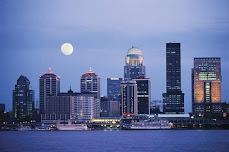
Sooooo... It's been awhile since I posted. I've been busy working, and spending lots o'time with my husband and kiddoes, and visiting my mommy et al out of town, and participating in Emily's wedding (pics to come--I think). I'm leaving for Spain SOON, and I'm kind of freaking out about it, if you want to know the truth (to quote H. Caulfield). I have also been trying to get a bit of reading in before I leave, and I finished the Philip Pullman trilogy last week. I cried all through the end of the book. It's an amazing story, and you don't know where it's going about 90% of the time (unusual for me + young adult fiction), and it's really really good to read. And then you get to the end, many things click into place, and it's just HEART-wrenchingly awesome and painful. I am still processing many things about the book, but I'll tell you this: it is in the running to be one of my top-ten all time favourite books. Ever. I mean, if you take the three together as one work, that is. Because they're like Lay's potato chips: you can't eat just one. (Was that Lay's? Or Pringles? I can never remember.) I really am loathe to talk much about the books, though, because one cannot summarize without spoiling parts of the plot and some important thematic elements. I suppose the most important thing to tell you is that the book is a sort of spiritual/philosophical treatise, told through the story of this girl called Lyra. There are several other main characters, but some of them don't come in till the second book, so I wouldn't want to give away which characters become important and which ones are less so. Suffice it to say that the books are a refutation of the fatalism of the religions with which we are familiar in this world, and instead the trilogy seeks to offer an alternative cosmology and dogma. In fact, I feel that the Pullman trilogy is a parable which represents most of my religious/spiritual beliefs. It's just SO GOOD. Go read it. Right now. Please.
I have also started reading a comic (oh, 'scuse me, ahem... 'Graphic Novel') called Castle Waiting by Linda Medley. It is so great. My husband--who knows my tastes to a tea, and indulges them so generously--recommended it to me, and bought me my very own hardback of the first collection (which is all the story that's been published so far). It is sort of a reworking of many popular fairy tales and childhood stories that we in the European-influenced world are familiar with. It uses some of the most popular myths as a backdrop for fleshing out this world and this story in which a castle (Sleeping Beauty's castle) is sort of "left behind"--abandoned. But the servants wait on. Meanwhile, this pregnant woman on her own seeks out the castle as the place to birth and raise her child. We don't know what she's running from, but we presume it's the father of the baby, right? Anyway, the whole story is just hilarious, and full of good witches and bad witches and wisewomen, and storks and bears who talk, and demons and princes and blacksmiths and ladies-in-waiting et al. Linda Medley draws beautifully clearly and with a lot of whimsy, adding to the overall cleverness and fun of the unexpected tales she turns.

So go read. And wish me luck as I "Vaya con Dios" to España. ¡Oy!


















